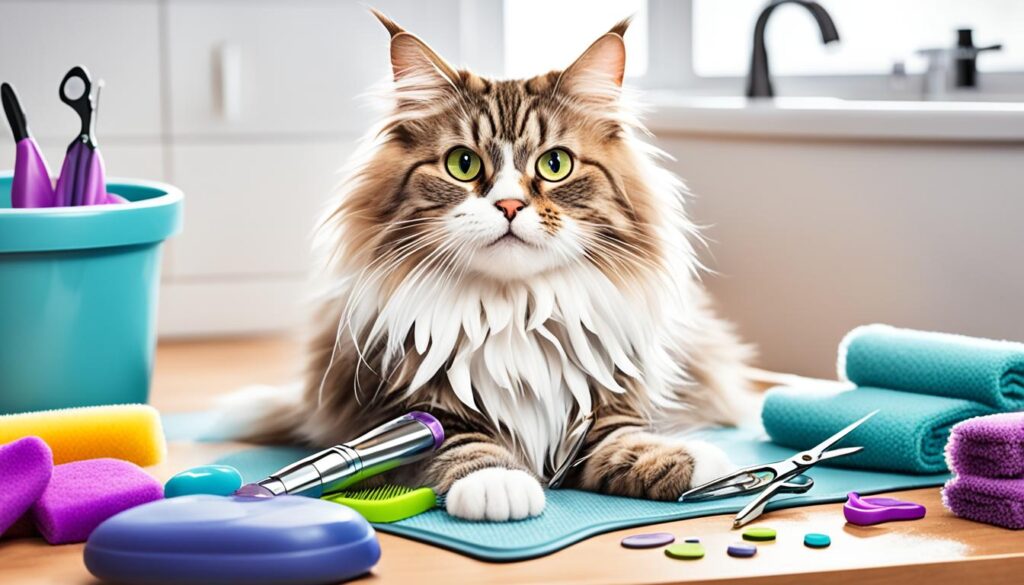Furry Friends Welcome: A Guide to Pet Health

Did you know that owning a pet can actually improve your overall health and well-being? It’s true! Studies have shown that having a furry companion can lower blood pressure, reduce stress levels, and even improve cardiovascular health. But as a responsible pet owner, it’s essential to prioritize your pet’s health and wellness to ensure they live a long and happy life. In this comprehensive guide, we will provide you with essential tips and advice for maintaining your pet’s health, from preparing for their arrival to veterinary care and mental stimulation.
Key Takeaways:
- Research and prepare for your pet’s arrival by understanding their specific care requirements.
- Select a high-quality pet food that meets your pet’s nutritional needs.
- Provide regular exercise and mental stimulation to keep your pet physically and mentally healthy.
- Maintain proper grooming and hygiene practices for your pet’s well-being.
- Schedule regular visits to the veterinarian for preventive care and early detection of health issues.
Preparing for Your Pet’s Arrival
Before bringing home your new furry friend, it’s important to make necessary preparations. By doing thorough research and gathering essential supplies, you can ensure a smooth transition for both you and your pet. Here are some key steps to take:
Research Your Pet’s Needs
Take the time to learn about your particular pet’s species and breed. Each pet has unique care requirements, so understanding their specific needs is crucial. Consider factors such as their habitat needs, exercise requirements, socialization and training, and any potential health issues associated with their breed.
Pet-Proof Your Home
Creating a safe environment is essential for your pet’s well-being. Pet-proof your home by removing any potential hazards or toxic substances. Secure loose wires, cover electrical outlets, and block off any areas that are off-limits to your pet. This will ensure their safety and give you peace of mind.
Gather Necessary Supplies
Before your pet’s arrival, gather all the supplies they will need. This includes housing such as a crate, bed, or litter box, as well as grooming supplies, feeding essentials, toys, and hygiene products. Having these items ready will help your pet feel comfortable and cared for from day one.
Quotes:
“Preparing your home and gathering the necessary supplies beforehand will make the pet’s arrival more pleasant for both the pet and the owner.” – Dr. Sarah Thompson, Veterinarian
| Essential Supplies | Notes |
|---|---|
| Housing | 24″ x 18″ crate for small dogs, litter box with high sides for cats |
| Grooming Supplies | Brush, comb, nail clippers, pet-friendly shampoo |
| Feeding Essentials | Food and water bowls, appropriate food for pet’s age and breed |
| Toys | Interactive toys, chew toys, and enrichment activities |
| Hygiene Products | Pet-friendly toothpaste, toothbrush, ear cleaner, and flea prevention |
In conclusion, preparing for your pet’s arrival is an important step in ensuring their comfort and well-being. Researching their needs, pet-proofing your home, and gathering the necessary supplies will set the stage for a happy and healthy life together.
Selecting the Right Pet Food
Providing a well-balanced and nutritious diet is crucial for your pet’s health. The right pet food can contribute significantly to their overall well-being. When it comes to selecting pet food, there are several factors to consider, such as pet nutrition, pet food selection, and feeding guidelines.
Researching the Best Food Options
Research is key to finding the best food options for your pet. Consider your pet’s breed and age when choosing their food. Different breeds and stages of life have specific dietary needs that require specialized nutrition. Whether you have a playful puppy or a mature cat, finding the right food that meets their nutritional requirements is essential.
Did You Know? Large breed puppies have different nutritional needs than small breed puppies. It’s important to choose food specifically formulated for their size and stage of development to ensure proper growth and reduce the risk of orthopedic issues in the future.
High-Quality Pet Food
Investing in high-quality pet food is one of the best decisions you can make for your furry friend’s health. Look for reputable brands that use high-quality ingredients with minimal fillers. Avoid food that contains artificial colors, flavors, or preservatives. Opt for natural and wholesome ingredients that nourish your pet from the inside out.
| Benefits of High-Quality Pet Food | What to Look For |
|---|---|
| Improved digestion and nutrient absorption | – Whole meat as the first ingredient – Limited fillers and by-products |
| Shiny coat and healthy skin | – Essential fatty acids like omega-3 and omega-6 – No artificial additives |
| Strong immune system | – Antioxidants and vitamins – Natural preservatives |

Feeding your pet a high-quality diet helps protect against nutrient deficiencies, allergies, and other health issues. It provides them with the essential nutrients they need to thrive.
Portion Sizes and Feeding Guidelines
Understanding portion sizes and feeding guidelines is crucial for maintaining your pet’s weight and overall health. Every pet is unique, so it’s important to follow the recommended feeding guidelines provided by the pet food manufacturer.
Did You Know? Overfeeding can lead to obesity, which can have serious negative effects on your pet’s health, including joint problems, diabetes, and a shorter lifespan.
Typically, these guidelines indicate the recommended portion size based on your pet’s weight and activity level. Adjust the amount of food accordingly to maintain a healthy body condition. It’s essential to monitor your pet’s weight regularly and consult with your veterinarian to ensure they are receiving the appropriate amount of food.
Remember that treats should be given in moderation and should not exceed 10% of your pet’s daily calorie intake. Monitoring your pet’s calorie consumption can help prevent weight gain and maintain their overall health.
By selecting the right pet food and following feeding guidelines, you can provide optimal nutrition for your beloved companion. A balanced diet plays a vital role in their overall well-being and can contribute to a long and happy life.
Exercise and Enrichment for Pets
Pets need regular exercise to maintain a healthy weight and prevent boredom. Daily walks for dogs and playtime for cats are essential. But physical activity is not enough to keep our furry friends happy and stimulated. Mental stimulation for pets is equally important to ensure their overall well-being.
One way to provide mental stimulation is through interactive toys. These toys engage pets’ natural instincts and provide them with a challenge. Puzzle toys, for example, can keep dogs and cats entertained for hours as they figure out how to remove treats from hidden compartments.
Interactive toys not only keep pets mentally engaged, but they also help prevent destructive behavior caused by boredom. They encourage problem-solving skills and promote mental agility.
Another great way to mentally stimulate pets is through agility training. This type of training allows pets to navigate through obstacle courses, improving their coordination and boosting their confidence. Agility training is especially beneficial for dogs, as it provides an outlet for their energy and stimulates their minds.
To ensure a pet-friendly environment that encourages both physical and mental stimulation, create designated play areas and interactive zones where pets can explore and engage with their surroundings. Include scratching posts, climbing trees, and toys that encourage their natural behaviors.
Incorporating regular exercise and mental stimulation into your pet’s daily routine is vital for their overall health and happiness. By providing interactive toys and engaging in agility training, you can enhance their mental wellbeing and strengthen your bond with them. Remember, a happy and healthy pet leads to a happier home.
Grooming and Hygiene for Pets
Proper grooming is essential for maintaining your pet’s appearance and overall health. Regular grooming practices such as brushing, bathing, nail trimming, and dental care play a vital role in ensuring your furry friend’s well-being.
To keep your pet comfortable and healthy, it’s important to use appropriate grooming supplies and pet-friendly products. Let’s take a closer look at these essential grooming practices and the hygiene products that can help keep your pet looking and feeling their best.
Brushing:
Regular brushing helps keep your pet’s coat clean and free from mats or tangles. It also helps to distribute natural oils, promoting a healthy and shiny coat. The frequency of brushing depends on your pet’s breed and hair length. For pets with longer hair, daily brushing is recommended, while shorter-haired breeds may require brushing a few times a week.
Bathing:
Bathing your pet helps remove dirt, odors, and allergens from their coat and skin. The frequency of baths varies depending on your pet’s breed, activity level, and overall cleanliness. It’s important to use pet-specific shampoos that are formulated for their skin and coat type. Avoid using human shampoos or products that may contain harsh chemicals that can irritate your pet’s skin.
Nail Trimming:
Regular nail trimming is essential for your pet’s comfort and prevents overgrown nails that can cause pain or difficulty walking. Use proper nail clippers designed for pets, as human nail clippers can cause injury. Take care to avoid cutting the quick, which is the sensitive part of your pet’s nail that contains blood vessels. If you’re unsure about nail trimming, consult a professional groomer or your veterinarian.
Dental Care:
Oral hygiene is critical for your pet’s overall health. Regular toothbrushing with pet-specific toothpaste helps prevent dental diseases such as plaque and tartar buildup, gum infections, and bad breath. In addition to brushing, you can also provide dental chews or treats that promote healthy teeth and gums. Regular veterinary check-ups may include professional dental cleanings if necessary.
Hygiene Products for Pets:
Choosing the right hygiene products is crucial for your pet’s safety and well-being. Look for gentle and pet-friendly grooming products that are free from harsh chemicals or irritants. Opt for shampoos, conditioners, and dental care products that are specifically formulated for pets. Additionally, consider using pet-safe ear cleaners, eye wipes, and paw balms to maintain their hygiene.
Grooming Supplies:
Having the right grooming supplies makes the process easier and more enjoyable for both you and your pet. Here are some essential grooming supplies to have on hand:
- Grooming brush or comb suitable for your pet’s coat type
- Pet-specific shampoo and conditioner
- Nail clippers or a nail grinder
- Toothbrush and pet-friendly toothpaste
- Grooming wipes for quick touch-ups
- Pet-friendly ear cleaner and cotton balls
- Paw balm or moisturizer
By incorporating regular grooming practices and using appropriate hygiene products and grooming supplies, you can ensure that your pet is clean, comfortable, and healthy.

| Grooming Supplies | Description |
|---|---|
| Grooming brush or comb suitable for your pet’s coat type | Choose a brush or comb that is designed for your pet’s specific coat type to effectively remove loose fur and prevent matting. |
| Pet-specific shampoo and conditioner | Use gentle pet-specific shampoo and conditioner to keep your pet’s coat clean, soft, and healthy. |
| Nail clippers or a nail grinder | Invest in quality nail clippers or a nail grinder to safely trim your pet’s nails without causing discomfort or injury. |
| Toothbrush and pet-friendly toothpaste | Regularly brush your pet’s teeth using a toothbrush and toothpaste specifically formulated for pets to maintain good dental hygiene. |
| Grooming wipes for quick touch-ups | Keep grooming wipes handy for quick touch-ups between baths to keep your pet looking clean and fresh. |
| Pet-friendly ear cleaner and cotton balls | Clean your pet’s ears using a pet-friendly ear cleaner and cotton balls to prevent the buildup of wax and debris. |
| Paw balm or moisturizer | Apply a pet-safe paw balm or moisturizer to keep your pet’s paws hydrated and protected, especially during harsh weather conditions. |
Veterinary Care for Pets
Regular visits to a veterinarian are crucial for your pet’s health. By prioritizing pet healthcare, you can ensure that your furry friend receives the necessary check-ups, vaccinations, and preventive care treatments.
During regular check-ups, the veterinarian will assess your pet’s overall health, monitor any changes, and address any concerns you may have. These visits also provide an opportunity to discuss your pet’s diet, behavior, and lifestyle.
Preventive care plays a significant role in maintaining your pet’s well-being. It helps to detect and address any potential health issues before they escalate. The proactive approach of preventive care can save you and your pet from unnecessary stress and expenses down the line.
Make sure to stay up-to-date with your pet’s medical records, which include vaccination history and any treatments received. This will help facilitate effective communication with your veterinarian and ensure continuity of care.
By following your vet’s advice for proper care and scheduling regular check-ups, you can provide your pet with the best possible healthcare. Early detection and intervention are crucial in ensuring a long and happy life for your furry companion.
“Preventive care can add years to your pet’s life and life to their years.”
To give you a visual representation of the recommended frequency of veterinary check-ups, here’s a table outlining the general guidelines for different pet species:
| Pet Species | Check-up Frequency |
|---|---|
| Dogs | Once a year for young, healthy pets Twice a year for senior pets or those with health conditions |
| Cats | Once a year for young, healthy cats Twice a year for senior cats or those with health conditions |
| Small Mammals (e.g., rabbits, guinea pigs) | Once a year |
| Reptiles and Amphibians | Once a year |
| Birds | Once a year |
Remember that these are general guidelines, and your veterinarian may recommend specific check-up frequencies based on your pet’s individual needs.
Understanding Preventive Care
Preventive care involves a variety of measures aimed at keeping your pet healthy and preventing potential health problems. It encompasses:
- Vaccinations to protect against common diseases
- Flea and tick prevention
- Heartworm prevention
- Dental care, including regular teeth cleaning
- Parasite control, such as deworming
Following a preventive care schedule tailored to your pet’s needs is essential for their overall well-being and longevity. It’s crucial to work closely with your veterinarian to ensure your furry friend receives the necessary preventive care measures.
Regular veterinary care and preventive measures are key to keeping your pet in optimal health. By scheduling regular check-ups and following your veterinarian’s advice, you can provide your pet with the care they deserve and enjoy many happy and healthy years together.
Mental Stimulation and Training for Pets
Pets can often experience boredom and anxiety, just like humans. To keep their minds engaged and their spirits high, it’s essential to provide them with mental stimulation and proper training. This not only prevents behavioral issues but also strengthens the bond between you and your furry friend.
There are various ways to stimulate your pet mentally. Interactive toys and puzzles are excellent tools for engaging their minds and challenging them to problem-solve. These toys come in different shapes and sizes, catering to different pets’ needs and interests. Whether it’s a treat-dispensing puzzle or a hide-and-seek toy, these activities provide mental exercise and entertainment for your pet.

Training sessions are another effective way to keep your pet mentally stimulated. Positive reinforcement training is a widely recommended technique that focuses on rewarding desired behaviors rather than punishing unwanted ones. By using rewards such as treats, praise, and playtime, you can teach your pet commands, tricks, and good manners. This type of training not only instills discipline but also builds trust and strengthens your bond with your pet.
When training your pet, consistency is key. Set aside dedicated training sessions with short, focused exercises. Keep the training sessions positive and enjoyable for both you and your pet. Patience, repetition, and positive reinforcement are the pillars of successful pet training.
Benefits of Pet Mental Stimulation and Training
Engaging your pet in mental stimulation activities and training offers a multitude of benefits:
- Reduces boredom and anxiety
- Enhances problem-solving skills
- Stimulates cognitive development
- Strengthens the pet-owner bond
- Improves overall behavior
- Promotes physical exercise and coordination
Providing mental stimulation and training for your pet is an essential aspect of their overall well-being. It not only keeps them mentally sharp and engaged but also contributes to their happiness and quality of life.
Conclusion
Responsible pet care is the key to ensuring the health and happiness of your furry friend. By prioritizing their well-being, you can create a strong bond and provide them with a fulfilling life. Remember to pay attention to their health needs, including regular check-ups and vaccinations from a trusted veterinarian.
Nutrition plays a vital role in your pet’s overall well-being, so be sure to select high-quality food that meets their unique dietary requirements. Regular exercise and mental stimulation are essential for preventing boredom and promoting a healthy lifestyle. Engage in playtime, interactive toys, and positive reinforcement training to keep their minds sharp and their hearts content.
Grooming is not just about appearances; it is an important aspect of pet care. Regular brushing, bathing, and dental care contribute to their overall health and happiness. By taking care of their hygiene needs, you can prevent discomfort and maintain their well-being.
Remember, being a loving and responsible pet owner is a commitment that lasts a lifetime. Cherish the moments you spend with your furry friends and provide them with the love, care, and attention they deserve. With responsible pet care, you can ensure that your pets live a joyful and healthy life.
FAQ
What should I research before welcoming a pet?
Before welcoming a pet, it is important to research their species and breed, their care requirements, habitat needs, socialization and training, and veterinary care. It’s also crucial to pet-proof your home and gather the necessary supplies.
How do I provide a well-balanced diet for my pet?
To provide a well-balanced diet, research the best food options for your pet’s breed and age. Choose high-quality dog or cat food that meets their specific dietary needs, understand portion sizes, feeding schedules, and any dietary restrictions.
How can I ensure my pet gets regular exercise?
Regular exercise is important for your pet’s health. You can ensure they get exercise by taking them on daily walks for dogs and providing playtime for cats. Consider interactive toys, puzzles, and agility training to keep them physically and mentally stimulated.
How should I groom and maintain my pet’s hygiene?
Proper grooming includes regular brushing, bathing, nail trimming, and dental care. Use appropriate grooming supplies and pet-friendly products to ensure your pet’s comfort and well-being.
How often should I take my pet to the veterinarian?
Regular visits to the veterinarian are crucial for your pet’s health. Schedule check-ups, vaccinations, and preventive treatments as recommended. Stay up-to-date with your pet’s medical records and follow your vet’s advice for proper care and early detection of any health issues.
How can I provide mental stimulation for my pet?
Pets can experience boredom and anxiety, so providing mental stimulation is important. Use interactive toys, puzzles, and training sessions to engage their minds. Positive reinforcement training helps them develop good behavior and strengthens the bond between you and your furry friend.
Source Links
- https://www.linkedin.com/pulse/ultimate-guide-pet-care-keeping-your-furry-friends-happy-moazam-ali
- https://www.wfla.com/bloom-tampa-bay/essential-pet-care-products-a-guide-to-keeping-your-furry-friend-happy/
- https://www.pethealthglobal.com/blog/39_a-new-pet-owners-guide-to-pet-health-and-wellness.html